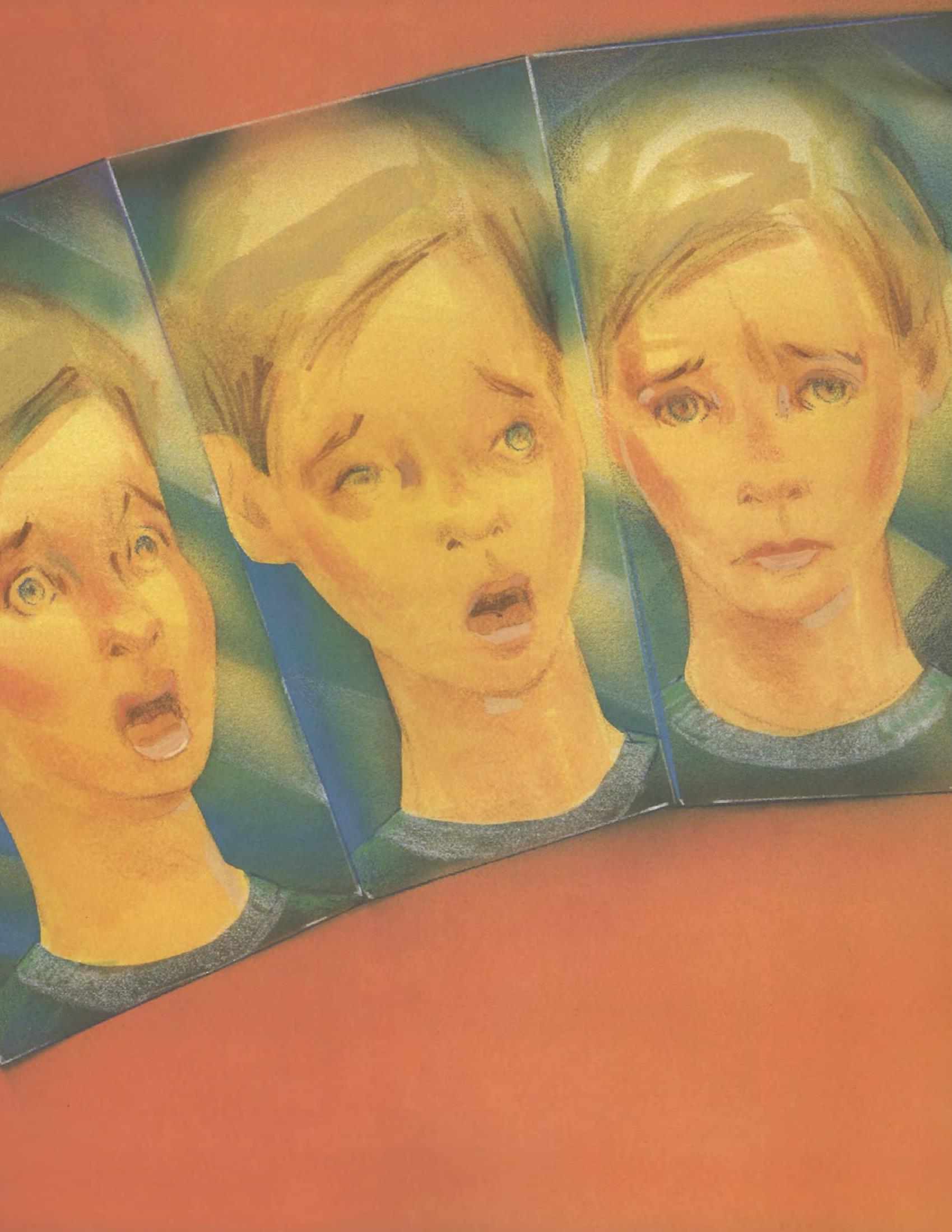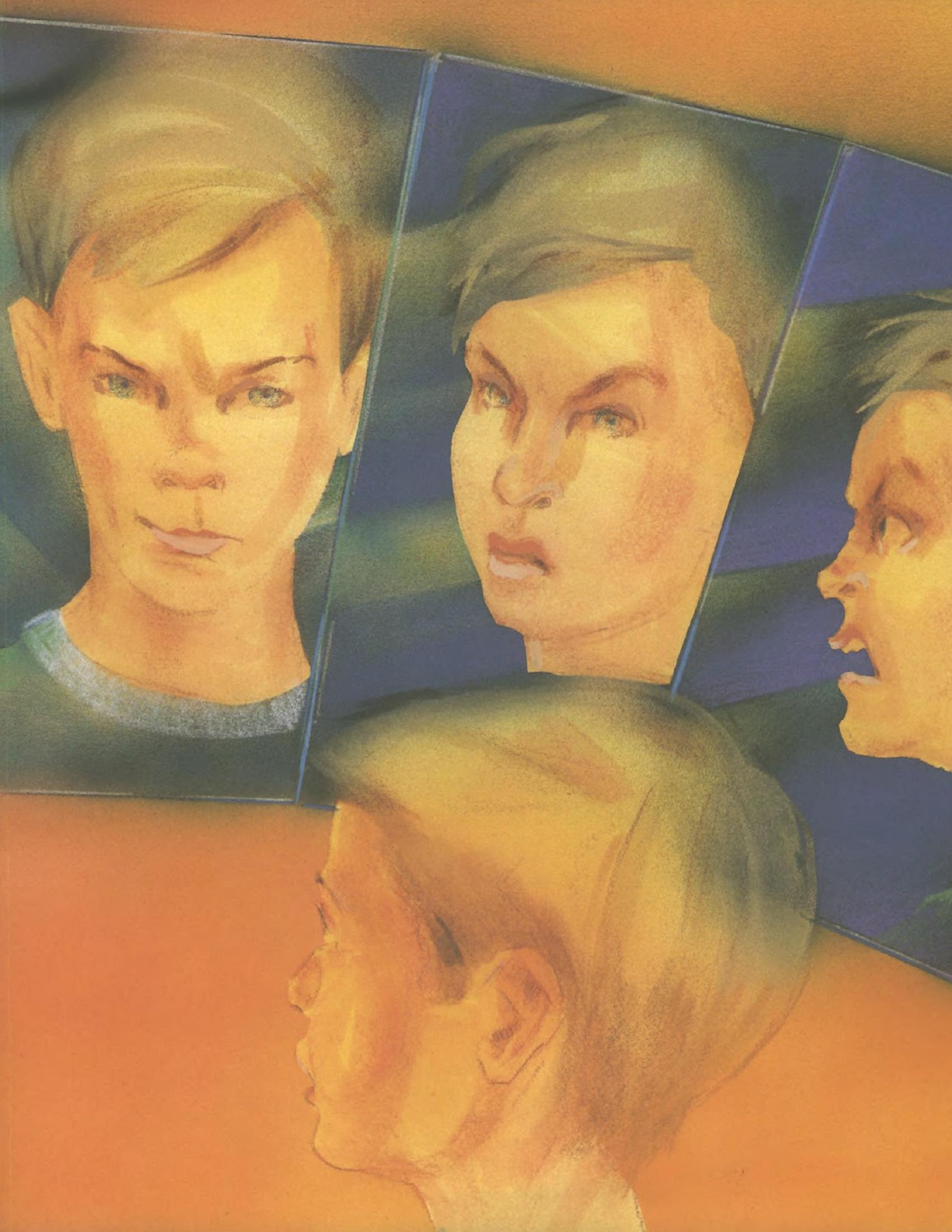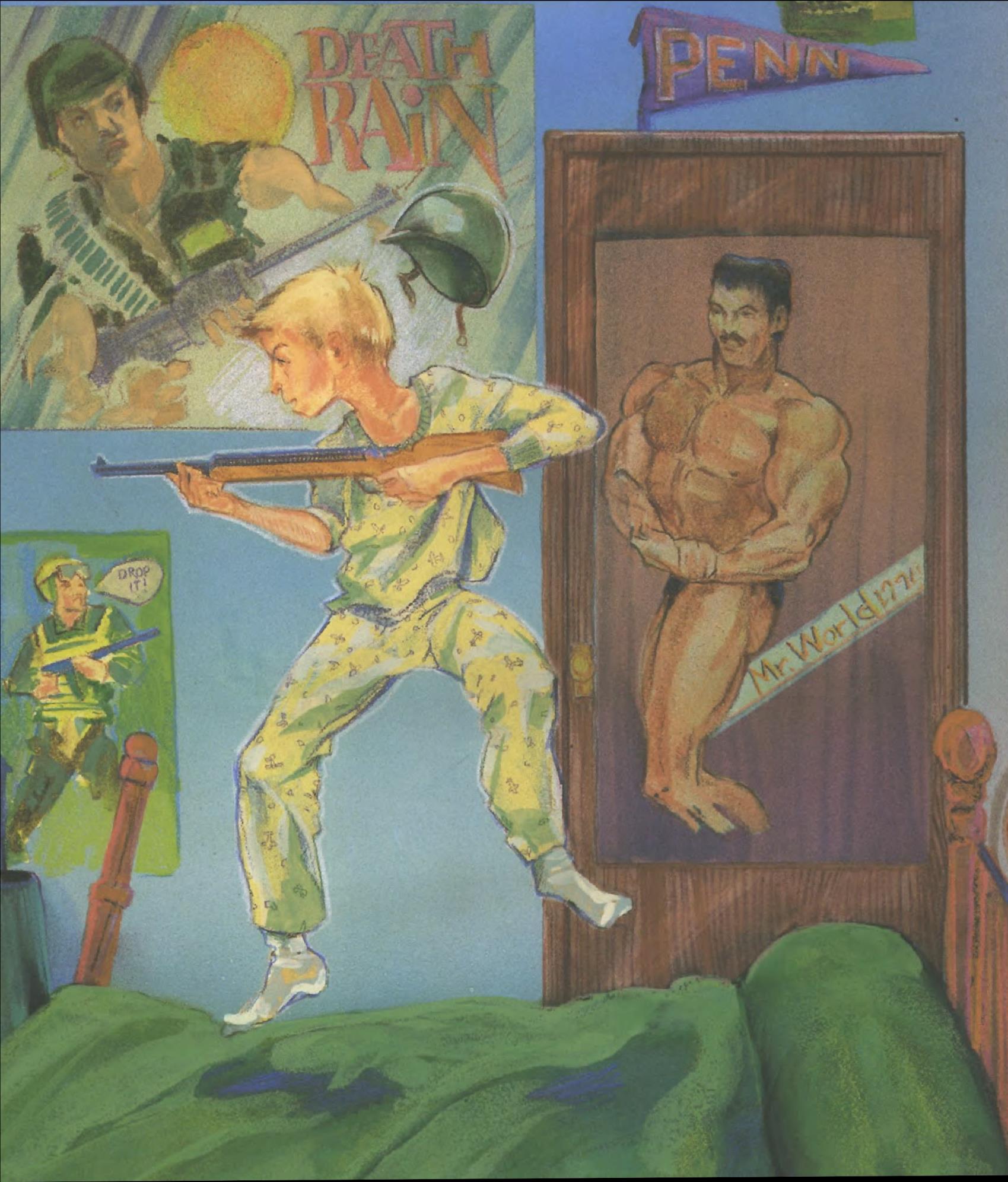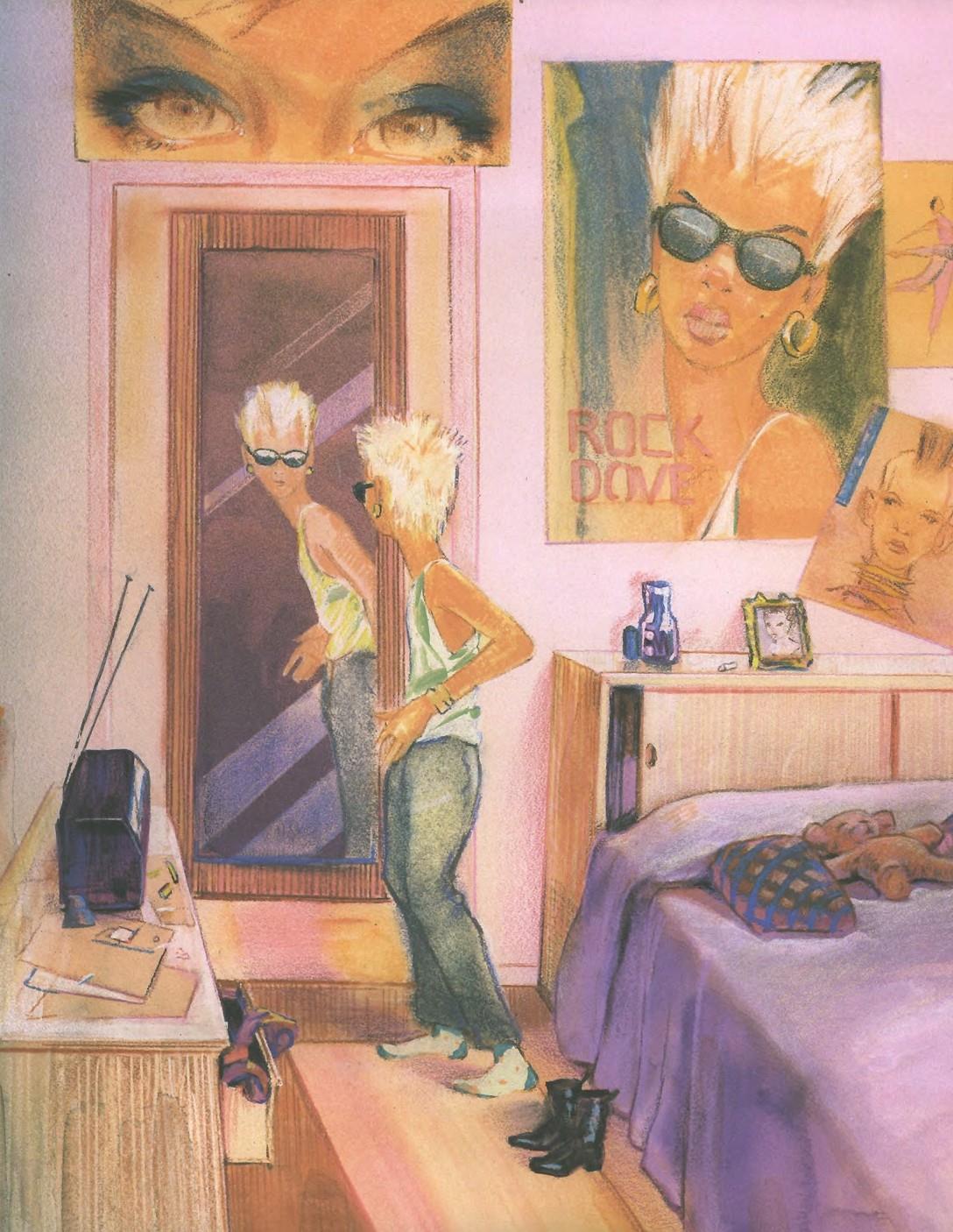Chapter 3
WHY DO BULLIES AND VICTIMS EXIST?
The Roles We Play
As we grow up, we learn to play various roles in life, such as son, daughter, child, student, team member. Some of these roles change, some stay with us.
Some of these cmnbine to form a life role and lead us to become the adult we grow into. Examples of roles we might become are: teachers, lawyers, doctors, writers, and so on.
These are professional or career roles that we take on in order to earn a living or because they are meaningful to us, and we enjoy or have a talent for them.
There are other roles we take on because we care for another person or persons. Some of us get married and have children. We take on the role of husband, wife, mother or father.
These roles that we take on because we want to are called conscious roles, meaning that we are aware of them. We purposely become an athlete, a policewoman, a nurse, a performer.
There are other roles we take on without purposely choosing them. These are called unconscious roles, meaning that we are not aware that we have taken them on. These roles may come from feeling the need to protect ourselves from whatever we feel we need protection from -
usually
something that has threatened us in competitive activity.
28
We create these unconscious roles because we are afraid.
For example, you may have a fear of taking tests, so you develop the role of "Someone Stupid." You pretend that you are Someone Stupid as a response to the fear that you will flunk your tests. You say, "Of course I won't do well on the test. I'm just so stupid." If you succeed in your role, no one will expect you to do well and you will be safe.
Perhaps you have a fear of playing sports. So, you develop a role of "Someone Weak." You become Someone Weak, saying,
"I'm not strong, so you better not pick me for your team." Or,
"I better not play this game, because I could hurt myself."
Perhaps you have a fear of speaking in front of the class.
In order to avoid doing it, you may create a role of "Someone Shy." You become this character, Someone Shy, and say all the things you think Someone Shy would say.
Fear does this to us. It has a control over us, and can sometimes turn us into "playwrights," writing scripts for ourselves that make us say and do things that we may not really want to say or do.
If you are afraid that people will take advantage of you, perhaps you take on the role of Bully. As Bully, you control other people, telling them what to do, so you don't have to do anything anyone else wants you to do.
Bully Characteristics
How do you recognize the bullies in your life? Can you tell when you see one? Bully characteristics include...
1. Facial expressions: Angry, bossy, frowning -
hard,
mean, cold, "make my day" scowls.
29
2. Body expressions: Signals of power or threat -
shaking and/or pounding fists, rude finger displays, hands on hips, arms crossed on chest, legs spread apart, chest out, chin forward, shoulders hunched, swaggering walk.
3. Language: Words that are cutting, hurtful, mean or that frighten, harass, embarrass, or tease - like "punk,"
"J.erk " "chicken " "four eyes " "shorty" "nerd " "dork"·
'
'
'
attitudes that s a y, "I'm bette' r than y o' u" or "I deserve'
more than you."
4. Behavior: Isolation; signals of displeasure; violent actions, threats; throwing weight around.
Victim Characteristics
Have you ever considered that a victim (the one who is being picked on) plays a part too? If you've been a victim, think about the role you've played and how you communicated with the bully. Do you think there's anything you did that made you a prime target for a bully to pick on?
30
You already know that a bully acts like a superior person, one who appears to have control and power over another. A victim, on the other hand, acts like an inferior person, one who becomes a servant and does what the "superior" person wants.
The reason the victim acts this way is because he or she is afraid. The bully and victim take on a "master/slave" or
"leader/follower" relationship. They are both afraid, but act out their fears in different ways.
Victim characteristics include:
1. Facial: Fearful, timid, shy, fragile, weak, sad, sorrowful.
2. Body: Arms limp by side, shoulders drooped, shaking, head bowed, legs trembling, knees knocking, feet turned inward, looking down at ground, crouched.
3. Language: Statements like... "I'll give you anything, just don't hit me." "I'll tell my mother on you." "I guess I am a nerd, now can I have my hat back?" An attitude that says, "I feel inferior to you; you are better or stronger than I am."
4. Behavior: Quiet, shy; overly careful actions; never pulling attention to him or herself.
The Vicious Circle
A kid may not always get the attention he needs at home.
In order to get that attention, he may play the role of "Poor Me." In this way, he bullies his parents into feeling sorry for 31




him and doing things to make him happy, which gives him a lot of power. He uses "self pity" to manipulate his parents.
Using tears and manipulation in this way, this kid-as-victim turns into kid-as-bully. His parents believe he is weak and needs protection. But actually he's not weak at all. He's very powerful! He uses his feelings to force his parents into treating him as "special" or "overly sensitive."
This manipulation, however, usually backfires. Once he takes on the role of "special" and "overly sensitive," he is often singled out by bullies to pick on. This fits into his role as victim, makes the "Poor Me" all the more real, and makes his parents want to protect him even more.
This is what is called a vicious circle. In order to get power in the household, to dominate (and bully) his parents into doing what he wants, the kid pretends (plays out the role of) weak, hurt, fragile, sensitive. This not only gets his parents'
attention, which is what he wants, but also gets attention from a bully who picks on the weak and helpless "Poor Me." His parents then protect him even more. Do you see the vicious circle?
If you can see through the roles and games that people play, no one will be able to control you, or get you to do things you don't want to do. You will be able to relate in healthier and more intelligent ways. There is no need for people to bully, control, or rule others. With understanding, human beings can cooperate without control or fear, and share equally in this world.
34
The Role Models We Have
What makes us start acting out unconscious roles? What influences our thoughts so that we become a character who is not real - an actor with a mask?
A character is defined by his or her:
1. Characteristics: Physical attributes and activities.
These include how the character looks, walks, talks; what language he/she speaks; the clothes he/she wears.
2. Influences: The mental and psychological make-up of the character. This includes how he/she feels, thinks and acts.
We've already looked at the characteristics of bullies and victims. But what influences them? Where do they learn these characters they play? From television? Movies?
Performers? Comics? Videos? Books? Parents? Teachers?
Community leaders? National leaders?
The things that influence a person to be a bully are the very same things that influence a person to be a victim! Are you surprised? In the movies or on TV, the bully is always portrayed as "the bad guy," the one the "heroes" are trying to bring under control. The so-called "heroes," however, can be just as violent as the "bad guys."
Every bully, at some time in his or her life, has been a victim. If you have been the subject of abuse, there's a good chance you will turn around and dish it out. That's why some of the "heroes" we see are violent. They've been treated with 35





violence, so they respond with violence. You could say that a bully is a victim in disguise!
Have you ever noticed that when you come out of a theater, you feel like, and identify with, one of the characters you've just seen? If the bully is portrayed as a "bad guy," the victim may be portrayed as "the good guy." If the bully is portrayed as "the good guy," the victim can be portrayed as
"the bad guy." Sometimes you identify with the "bully" and sometimes you identify with the "victim."
It's easy to identify with a "bully" (like "Dirty Harry") when he's doing away with all the "villains." On the other hand, it's also easy for us to identify with a "victim" (like Woody Allen creates in many of his movies), because we laugh at him, we like him, and we want him to get what he wants.
When we attempt to act out roles we think we ought to play, or identify with people we think we ought to be, we are imitating "role models" (people to admire and be like). Doing this can cause us to become confused about who we are.
Sometimes it's difficult in this world to be who we are - mainly because we've been shown many role models but haven't been taught how to be ourselves!
It takes an incredible amount of energy to work at being like someone else when you're not. Being yourself is the only person you can possibly be and be happy.
Heroes and Heroines
When I grew up, every young man's "hero" was John Wayne in his portrayals of the all-American male -
a tough,
lonesome, unfeeling, hard, violent, cowboy/soldier. In his 38
movies, agreements were settled by punching, strangling, knifing, or shooting the "enemies." This was the way I was shown how to resolve conflict. The characters created by John Wayne were my role models.
Today, we have very similar "heroes;" we have a wide range of characters on television and in the movies who use more and more violence to solve their problems. Are these characters truly heroes? Do you girls find these characters exciting?
Would you like to act like them? Be like them? I have seen women in movies punch, strangle, stab, and shoot people they disagree with, just like men do. They are just as capable of intimidation and control through violence. Who is your female role model?
Talk to your parents and teachers about roles and role models. See if you can discover what else makes bullies and victims play the parts they play.
The World Around Us
Why would a person want to bully you? Why would you want to bully someone? If you can see that there are times when you have wanted to bully, or times when you have actually been a bully, then youknow that a bully is not really a "bad" person.
We all get "bully" feelings from time to time. We want other people to do what we want them to do, and we are prepared to use force to get them to act according to our wishes. One reason we feel this wayis that wehave hurt feelings or angry thoughts -
perhaps bad feelings about
ourselves. As a result, we try to control someone else, thinking this will ease our pain or protect us from being hurt by that person.
39
We bullies act tough and want to frighten or hurt people who are smaller or "think" smaller than we do. We think other people are better than we are, so we are constantly trying to prove ourselves.
Sometimes we bullies act tough because we're afraid that other people are going to hurt us; we pretend to be tough so other people won't bother us.
Sometimes we bullies act tough because we're upset; perhaps we've been fighting at home with our parents or brothers and sisters. We are so angry inside that we explode and take it out on other people.
Influences Today
There are many different circumstances in your world that could lead you to become a bully. Maybe you've never thought about these before. Here are some possible influences: A. Your Family
Your family might be the last thing you'd think of as a cause of your being a bully, but your family is at least partly responsible. Here are some ways your family could influence your bullying. Write down any comments you want to make. Do your parents...
1. Offer harsh physical or verbal punishment?
40
2. Allow you to get away with aggressive behavior?
3. Act violently toward you or toward each other?
4. Ridicule or hurt you by teasing you or laughing at you?
5. Talk much with you?
6. Spend much time with you outside of mealtime?
7. Take you along anytime, anywhere?
8. Praise or encourage you?
9. Exchange ideas or thoughts about life with you?
41
10. Set limits on your behavior?
11. Know or care where you are after school?
12. Care what kind of friends you have?
B. Your Friends
If you have an interest in the Martial Arts, for ·instance, chances are you will make friends with others who share that interest. We generally make friends through what we have in common, to a person we are drawn to, or with someone who wants to be friends with us. In the same way, it's common for one bully type to become friends with another bully type. Gangs of tough youths get together and support one another in their bullying behavior.
We all need to be acknowledged and supported for who we are. When we are rejected by people we know, we feel frustrated and angry. We feel that the world is against us. We get a "me vs. you" or a "we vs. them" feeling.
42
C. Your School
Your school can contribute to creating bullies without being aware of it. Schoolyard supervisors like Mrs.
Potter, in the first story in this book, show kids how to be bullies. Instead of appealing to your nonviolent nature, some teachers express violence and don't understand why some kids are violent in return.
It's important to have rules and regulations that help your school run efficiently. However, if these rules and regulations are overly strict and lacking in understanding, your school may be participating in teaching kids how to be bullies.
D. The Media
All forms of media - television, movies, video games, comics, magazines - can promote violent bully behavior.
In the movies, for instance, Rambo is portrayed as a hero; G.I. Joe is a hero in comics. Television, of course, has many bully heroes. When we, as children, see how commonly aggressive behavior is displayed, we learn that it is acceptable, and that in many cases it is rewarded.
Two major hazards:
1. Violent television programs are so commonplace that we become numb to the bullying and the violence, and ...
43
2. Kids who watch a lot of violent TV programs learn to see the world as a threatening, hostile place, and become afraid.
We learn that we must deaden our feelings and become distrusting and aggressive in order to survive.
E. Community Leaders
Some competition can inspire us to improve ourselves, but other forms of competition can be harmful to the way we think and feel. Business can create a very competitive environment. What's the situation in your community? Do business leaders compete with each other and become violent? Or do they "network" and put their know-how together to create a better community?
F. Politicians
We have many fine politicians who work to create changes that are healthy for all of us. Others are politicians because they enjoy being powerful - making decisions, telling people what to do, and how to do it.
Because we have political parties, there is often opposition and conflict created between them.
G. Military Leaders
The entire military operation is reliant upon people who give orders and people who take them. Soldiers are bullied into killing and bullied into believing that they ought to kill for their country.
44
Military leaders of opposing countries play the game of one-upmanship: Which country is better? Who can be stronger? Who can win the war? We are bullied into believing that we ought to want to be better than our friends, stronger than our neighbors, and that we ought to want to win in a struggle with other human beings. I believe we have wars because we have been bullied into believing that we should have them.
Influences From Long Ago
We've already learned that parents, schools, communities, and the media can all contribute to teaching us to be bullies.
But there is something else deep inside us that can also be a cause.
Have you ever watched a dog and cat when they meet for the first time? Do you remember what they do? They freeze.
Then if the cat moves, either the dog chases the cat or the cat stands its ground and fights the dog. This is called "The Fight or Flight Response." The cat either fights the dog or runs away from the dog, or vice versa.
Humans have this response too, to protect ourselves from being attacked. Back in the days of the cave man, humans would frequently be attacked by wild animals. They would have to fight the animal or run away in order to survive. The creature who could fight the best or run the fastest was the one that survived. This phenomenon is called "survival of the fittest." If you have studied Darwin and the theory of evolution, you know all about this.
45

As far back as man can reme1nber, living creatures have been afraid of predators and have adapted self-defensive, aggressive ways in order to survive and live. Do you think it's possible that today we human creatures try to dominate and control others because we think we still need to in order to survive?
I do. I think mankind learned this behavior long ago, and that we've been passing it down to each other, generation after generation. The question to ask, however, is: Is this behavior necessary today?
When humans lived in small tribes with little food supply and a scarcity of shelters, fighting to survive may have been necessary. But today, with advancements in science and technology, we have created an abundance of food, shelter, and clothing. Do we still have to fight to survive? Why do humans still believe we need to compete in order to live? Why is one person rich and another poor? Why does one country have so much while others have so little? Write down your thoughts and feelings:













